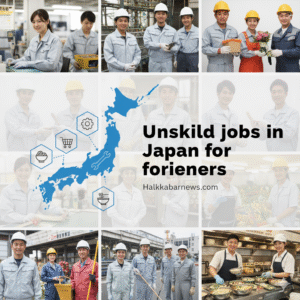Unskilled jobs in Japan for foreigners
Unskilled Jobs in Japan for Foreigners
Unskilled jobs in Japan for foreigners. Japan is one of the most popular destinations for foreign workers seeking unskilled labor opportunities. With its aging population and labor shortages across sectors, Japan is increasingly relying on foreign workers to fill gaps in industries such as hospitality, agriculture, construction, and manufacturing. Unskilled jobs in Japan offer foreigners the chance to earn a living and gain work experience in one of the most technologically advanced and culturally rich countries in the world.

Unskilled jobs in Japan for foreigners
Job Details
Unskilled jobs in Japan are typically entry-level positions that do not require specialized training or education. These roles are ideal for individuals with limited experience who want to start working in Japan. Some common unskilled job categories include:
- Factory Workers: Packaging, assembly line work, or operating machinery in manufacturing plants.
- Agricultural Workers: Harvesting crops, planting, and maintaining farms.
- Construction Laborers: General labor tasks on construction sites, including carrying materials, operating basic equipment, and assisting skilled workers.
- Cleaning Staff: Cleaning hotels, offices, or public spaces like stations and shopping centers.
- Restaurant Staff: Kitchen helpers, dishwashers, or general assistants in restaurants and cafes.
- Warehouse Workers: Sorting, packing, and shipping goods in distribution centers.
These jobs typically involve physical work and may require the ability to work long hours or night shifts.
Requirements
While unskilled jobs do not require formal qualifications or professional experience, there are certain basic requirements:
- Work Visa: Foreign workers need a valid work visa to be employed in Japan. For unskilled positions, the Specified Skilled Worker (SSW) visa or Technical Intern Training Program (TITP) are the most common.
- Age: Most companies prefer workers aged 18 to 35. However, some positions may accept older applicants, depending on the nature of the work.
- Physical Fitness: Many unskilled jobs involve manual labor, so applicants should be physically fit and able to handle the demands of the job.
- Basic Japanese Language Skills: While fluency is not required, having basic Japanese communication skills is helpful, especially for understanding instructions, safety protocols, and interacting with colleagues.
- Work Ethic: Employers value workers who are punctual, reliable, and can work well as part of a team.
Salary and Benefits
Salaries for unskilled jobs in Japan vary by industry and location but generally range from ¥150,000 to ¥250,000 per month. Factors like overtime, location, and job type can affect salary levels.
- Factory Workers: ¥160,000–¥230,000 per month
- Agricultural Workers: ¥180,000–¥250,000 per month
- Construction Workers: ¥180,000–¥250,000 per month
- Cleaning Staff: ¥150,000–¥200,000 per month
- Restaurant Staff: ¥160,000–¥220,000 per month
Benefits typically include:
- Health Insurance: Workers are covered under Japan’s public health insurance system.
- Transportation Allowance: Many employers cover transportation costs to and from work.
- Accommodation: Some companies offer accommodation or a housing allowance, particularly for workers in rural or remote areas.
- Paid Leave: Depending on the employer, workers may be entitled to paid annual leave, public holidays, and sick leave.
- Overtime Pay: Overtime work is compensated at a higher rate, mostly 25% more than the regular hourly wage.
- Bonuses: Some employers provide end-of-year bonuses or performance-based incentives.
How to Apply: Unskilled jobs in Japan for foreigners
To apply for unskilled jobs in Japan:
- Find a Job: Search for job openings through websites, recruitment agencies, or government-supported programs like the Technical Intern Training Program (TITP).
- Apply Online or In-Person: Submit your resume/CV and any required documents to the company or recruitment agency. Some companies may require a Japanese-language resume.
- Visa Application: If you are selected, you will need to apply for the appropriate work visa. Companies may assist in the visa application process.
- Interview and Selection: You may need to attend an interview in person or online, depending on the company’s preference.
- Arrival in Japan: Once your visa is approved, you can travel to Japan and begin your job.
Alternatively, you can apply for jobs through agencies that specialize in hiring foreign workers in Japan.
Conclusion
Unskilled jobs in Japan offer foreigners a great opportunity to live and work in the country, especially if you are looking to gain international work experience. While these roles may not require professional qualifications, they provide a chance to earn a living, learn about Japanese culture, and save money for the future. As Japan continues to face labor shortages, the demand for foreign workers in unskilled jobs is expected to remain strong, making it an ideal time for newcomers to explore these opportunities.
FAQs
Q1: Do I need to know Japanese to get an unskilled job?
Basic Japanese language skills are often preferred but are not always required. However, being able to understand basic instructions and communicate with colleagues will improve your chances.
Q2: Can I bring my family while working in Japan?
Under most work visas, you can apply for dependent visas for your family members, but this depends on your visa status and the job type.
Q3: Is it difficult to get a work visa for Japan?
Obtaining a work visa for unskilled labor can be relatively straightforward if you meet the qualifications and have an employer willing to sponsor your visa.
Q4: Are there opportunities for career advancement in unskilled jobs?
While unskilled jobs may not offer immediate career advancement, many workers use these positions as stepping stones to more skilled roles or managerial positions within the company.
Q5: How many hours do I have to work in a week?
The typical work week in Japan is 40 hours, but overtime may be required in certain industries. Overtime pay is usually higher than the regular hourly wage.
Also Apply: Food Factory jobs in Japan for foreigners
